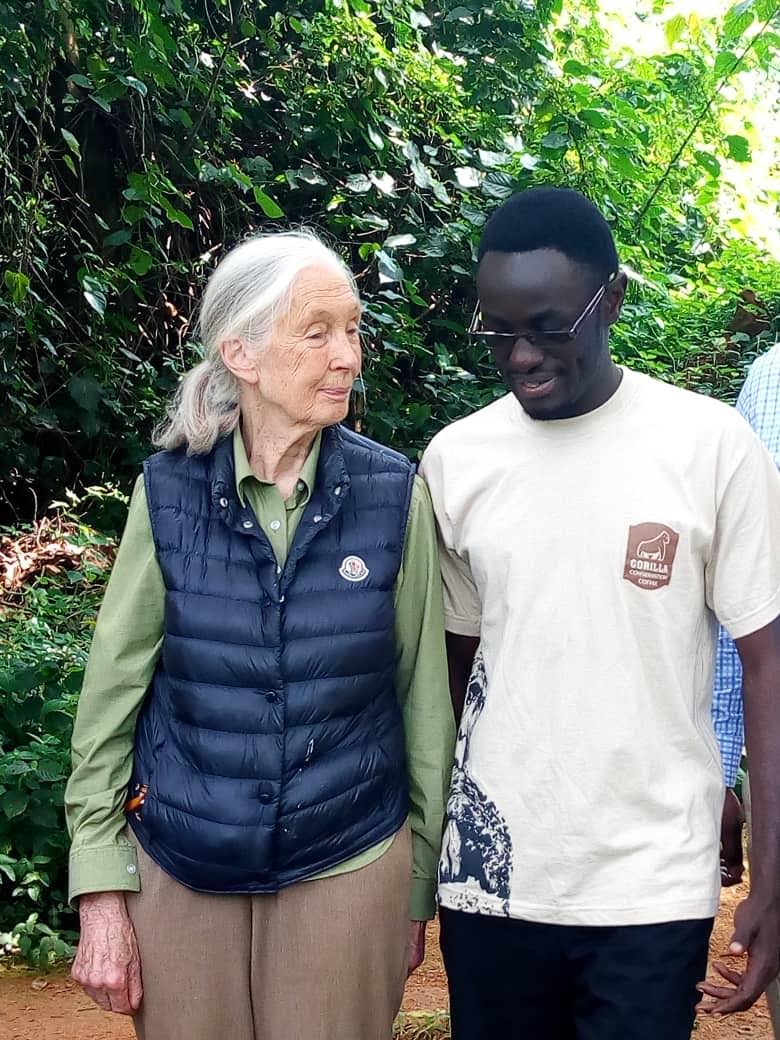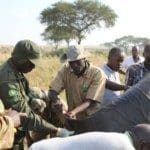In Murchison Falls National Park, Uganda, wildlife veterinarian and WCN 2019 scholarship recipient Dr. James Watuwa works quickly to free a baby African bush elephant from a snare. As the mother paces and trumpets nearby, James gently untangles the long, looped piece of wire cutting into the elephant’s hind leg and treats the wound with antibiotics.
Once finished, he steps away quickly, giving the mother ample space to safely re-join her baby. As James watches the two of them disappear into the forest, he worries about other hidden snares in the wildlife refuge.
While this is a unique experience for many, it not an unusual one for James. A typical day in the field for him can include rescuing a snared elephant, collaring a lion, or surveying mountain gorilla populations for the Ugandan and Rwandan governments. Taking care of animals has been a part of his life since childhood and his love for wildlife inspired him to become a veterinarian.

Dr. James Watuwa collecting a blood sample while other team members are working to radio collar an African bush elephant for studies and research monitoring. Picture credits: Erick Ntalumbwa
Early inspiration
James grew up in the Manafwa District of Uganda where his love for nature began in early childhood while taking care of his family pets and livestock.
While studying at Makerere University, he interned and participated in zookeeper activities at Uganda Wildlife and Conservation Education Centre (Entebbe Zoo) where he met and worked with zookeepers who mentored him into considering a career in wildlife veterinary medicine.

Carrying out a ballottement test to detect pregnancy on an African lioness during annual health checks at UWEC. Photo credits Kibuuka Diana
His choice to study veterinary medicine was a culmination of his determination to advance a career in conservation from a health perspective. Although studying veterinary medicine, James took the opportunity to make direct connections to wildlife through participating in elephant and lion collaring, rescuing snared animals, and getting involved in wildlife population counts like when he led a team in the 2018 Bwindi – Sarambwe mountain gorilla census
After graduating, he started as a volunteer wildlife veterinarian working in Bwindi Impenetrable National Park where he worked on protecting and monitoring mountain gorilla health.

Dr. James Watuwa talking with Dr. Jane Goodall. Photo credits Kennedy Kitandwe
He was later offered a job within Conservation Through Public Health NGO as a wildlife veterinarian. During this time, he co-led a research team in the 2018 Bwindi–Sarambwe Mountain gorilla census, sweeping through forests, finding gorilla trails and night nests, and collecting gorilla faecal samples for analysis. This work lead to a status downgrade from critically endangered to endangered. The experience also allowed James to develop his NGO management skills and knowledge in conducting research.
And his work in these areas continues to this day. He is currently leading a stress hormone strip project and working to reduce human-related threats to gorillas in the Bwindi Project by strengthening the capacity of rangers and forensic training.

Leading a team in the 2018 Bwindi-Sarambwe mountain gorilla census. Picture credits: Enos Nahabwe
Understanding the potential impact of oil exploration and mining
After graduating as a veterinary surgeon from Makerere University in 2017, James became concerned about how oil exploration might affect wildlife, particularly the wellbeing of elephants. While he believes that the oil industry has great potential to contribute to Uganda’s economic development, he is concerned the activities involved in oil and gas exploration and development can have detrimental impacts on sensitive ecosystems.
To find out more he is gathering faecal samples of the elephants and analysing them for stress hormones and helminths (parasites).

Collecting faecal samples for parasitology. Picture credits: Erick Ntalumbwa
The purpose of this study is to generate data on animal behaviours and levels of stress in relation to seasonality and geographical differences and to advise appropriate measures for minimizing potential impacts from development activities.
The elephant herds are counting on James and other Ugandan veterinarians to keep them happy and healthy!

Tracking African elephants with Wildlife Conservation Society staff in Murchison Falls National Park. Picture credits: Mabonga Joshua, WCS Uganda
Citizen science for amphibian conservation
James’ interest in conservation goes beyond the big animals you may expect to find in Uganda. He has also set up a community-based conservation project focused on amphibian and reptile conservation: the Endangered Wildlife Conservation Organization (EWCO). Knowing that community engagement is key to successful wildlife conservation efforts, this organization is at the forefront of identifying and conserving amphibian species and promoting knowledge of them in Ugandan communities.
Through the program, EWCO volunteers can gather and share information about amphibian and reptile observations. The data gathered is made available to HerpMapper Partners / groups who use the recorded observations for raising awareness, research, and conservation.

Examining a frog as part of the work with the Endangered Wildlife Conservation Organization. Picture credits: Kennedy Kitandwe
Today, James is a senior veterinarian at Uganda Wildlife and Conservation Education Centre (Entebbe Zoo). And if all this wasn’t enough, he is now earning his MSc in Wildlife Health and Management.
Wildlife veterinarians are desperately needed in greater East Africa. Upon graduation, James intends to continue his work as a wildlife veterinarian and conservation researcher to address some of Uganda’s most urgent wildlife and conservation priorities. For all creatures, great and small!

